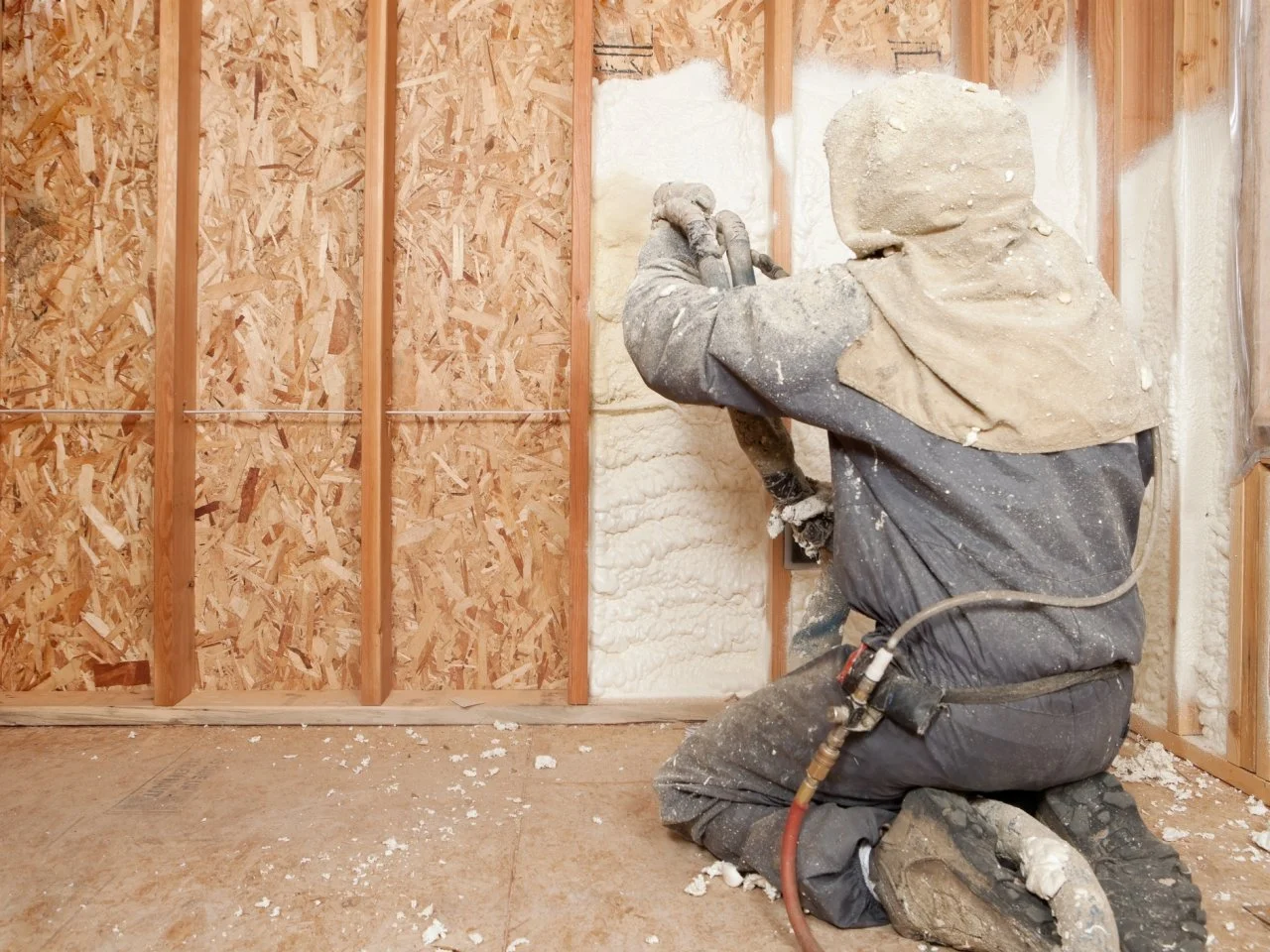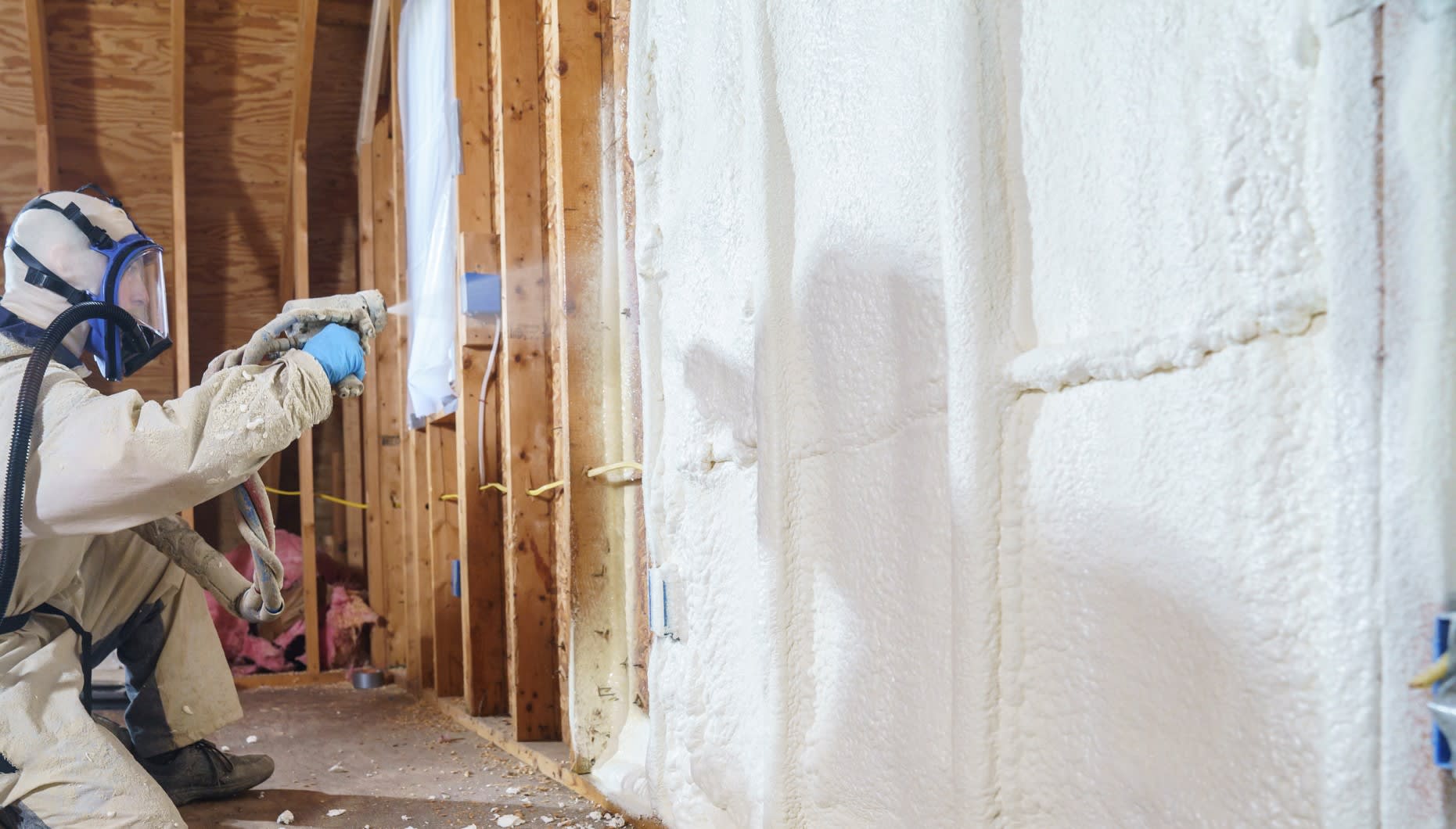Contrasting Spray Foam to Typical Insulation: Which Is Better?
Contrasting Spray Foam to Typical Insulation: Which Is Better?
Blog Article
Spray Foam: The Ultimate Solution for Air Sealing and Insulation
Spray foam insulation has actually become a leading solution for efficient air securing and thermal insulation, supplying a distinct mix of residential or commercial properties that establish it in addition to traditional techniques. Its capability to increase and fill gaps makes it especially efficient in protecting against air leak, which can significantly impact energy effectiveness. Understanding the full scope of its benefits, installation processes, and contrasts with various other insulation kinds is critical for making educated choices. As we discover these facets, the ramifications for both brand-new buildings and retrofits end up being progressively considerable. What elements should influence your choice?
What Is Spray Foam?
Spray foam is a functional insulation material that combines the concepts of air sealing and thermal resistance to enhance power effectiveness in buildings. Made up mostly of polyurethane or other comparable substances, spray foam is used as a fluid that expands upon call with surfaces, creating a strong, continuous layer of insulation. This one-of-a-kind residential or commercial property permits it to fill up gaps, splits, and voids that typical insulation products may ignore, offering a premium air seal.
There are two major sorts of spray foam: open-cell and closed-cell. Open-cell spray foam is lighter and more versatile, offering superb sound absorption and a reduced R-value per inch - Spray Foam. In contrast, closed-cell spray foam is denser, giving a higher R-value, dampness resistance, and added architectural integrity to developing parts
The application procedure normally involves specific tools, guaranteeing a smooth application that sticks to different substratums, including concrete, steel, and wood. This versatility makes spray foam ideal for both brand-new constructions and retrofitting existing frameworks. Its capacity to create a closed obstacle dramatically contributes to minimizing power intake and improving indoor air high quality, therefore making it a recommended choice among builders and property owners alike.
Benefits of Spray Foam Insulation
One of one of the most substantial benefits of spray foam insulation is its remarkable capability to produce a constant air obstacle, which successfully decreases power loss. Unlike typical insulation products, spray foam increases to load voids and cracks, making certain that air leakage is substantially lowered. This particular not just enhances power effectiveness but additionally leads to lower energy expenses with time.
In addition, spray foam insulation gives premium thermal resistance, adding to a much more steady indoor environment. Its high R-value per inch permits for reliable insulation in restricted spaces, making it perfect for attic rooms, wall surfaces, and crawl areas. Additionally, the moisture-resistant buildings of spray foam assistance avoid mold and mold development, promoting much healthier living problems.
Another critical advantage of spray foam insulation is its sound-dampening high qualities (Spray Foam). It effectively minimizes noise transmission in between rooms, developing a quieter and extra comfy home atmosphere. The toughness of spray foam also attracts attention, as it does not sag or resolve gradually, maintaining its performance throughout its life-span
Exactly How Spray Foam Functions
Comprehending just how spray foam insulation works is crucial for appreciating its performance in air sealing and thermal resistance. Spray foam insulation is composed of 2 primary parts: isocyanate and polyol resin. When these elements are combined, they undergo a chain reaction that creates the material to broaden swiftly, creating a thick foam that loads cracks, tooth cavities, and spaces.
As the foam broadens, it abides by surface areas, creating an airtight seal that substantially lowers air seepage. This characteristic makes spray foam insulation highly efficient at protecting against drafts and dampness penetration, which can result in energy loss and damages in time. Furthermore, the closed-cell variant of spray foam uses remarkable thermal resistance because of its inflexible structure, effectively lessening warmth transfer.
The distinct residential or commercial properties of spray foam permit it to adhere to irregular surface areas, ensuring detailed insurance coverage and a seamless barrier. Therefore, spray foam insulation not only boosts energy performance but likewise contributes to enhanced indoor air high quality by minimizing the build-up of contaminants and allergens. Ultimately, comprehending the mechanics behind spray foam highlights its duty as a superior option for insulation and air securing in both commercial and household applications.
Setup Refine Introduction

Before installment, the room needs to be properly cleaned and prepped, making certain that surfaces are devoid of particles, dampness, and dust. Since pollutants can endanger attachment and total efficiency, this step is essential. websites When the area is prepared, the application includes mixing both elements of the spray foam, which increases upon call and loads voids properly.
Educated specialists should conduct the installation, utilizing specialized equipment to ensure uniform coverage and optimum thickness. Safety and security preventative measures, consisting of putting on safety gear and guaranteeing appropriate ventilation, are crucial during this process. After application, the foam generally cures quickly, forming a strong obstacle that improves energy performance.
Contrasting Spray Foam to Standard Insulation
When examining insulation options, spray foam insulation stands out in contrast to conventional products such as fiberglass and cellulose. Unlike fiberglass and cellulose, which can enable air seepage, spray foam broadens upon try this site application, filling spaces and crevices to produce an airtight seal.
In addition, spray foam offers a greater R-value per inch than traditional insulation kinds, offering even more effective thermal resistance in a thinner profile. This particular is particularly valuable in areas with minimal cavity deepness. Spray foam is immune to moisture and mold development, which can be a substantial issue with cellulose and fiberglass, specifically in moist environments.
Nevertheless, spray foam insulation commonly carries a higher in advance price than its traditional counterparts. House owners have to weigh this preliminary financial investment versus long-term power cost savings and efficiency advantages. Ultimately, while both insulation kinds offer their purpose, spray foam becomes an advanced service for modern insulation needs, specifically in terms of air sealing and thermal effectiveness.

Verdict
In summary, spray foam insulation stands for a highly reliable service for achieving ideal air securing and thermal resistance. Its one-of-a-kind buildings, including moisture resistance and audio dampening, make it suitable for different applications in both brand-new building and constructions and retrofitting tasks (Spray Foam). Although the preliminary costs might be higher contrasted to typical insulation materials, the long-term benefits, such as considerable energy financial savings and boosted indoor air quality, validate the investment and underscore its worth in modern-day structure techniques.
Spray foam insulation has actually arised as a leading service for efficient air securing and thermal insulation, using a blog here special mix of residential or commercial properties that set it apart from standard techniques.Spray foam is a functional insulation product that incorporates the principles of air securing and thermal resistance to improve energy efficiency in buildings.When examining insulation choices, spray foam insulation stands out in contrast to traditional products such as fiberglass and cellulose. Eventually, while both insulation types serve their purpose, spray foam arises as a much more advanced remedy for contemporary insulation requirements, especially in terms of air securing and thermal performance.
In summary, spray foam insulation represents a very efficient service for attaining optimum air securing and thermal resistance.
Report this page